Psychotherapy Case Study: Tracey's Clinical Progress
VerifiedAdded on 2023/01/17
|44
|12521
|42
Case Study
AI Summary
This case study details the psychotherapy treatment of a 66-year-old Asian woman named Tracey, who presented with persistent depressive disorder and borderline personality disorder. The report covers her demographics, referral, history of presenting illness, past psychiatric and medical history, substance use, and family background. Tracey underwent psychodynamic psychotherapy after a year of Dialectical Behavior Therapy. The case outlines the management plan, including biological and psychological treatments, supervision, and the therapeutic frame. It further documents Tracey's clinical progress across different phases of therapy, including assessment, early, middle, and late phases, as well as termination and reformulation. The case highlights the trainee's learning experience, communication, and liaison with other professionals involved in Tracey's care. The case study provides a comprehensive overview of Tracey's therapeutic journey, emphasizing the complexities of her condition, treatment approaches, and clinical outcomes.
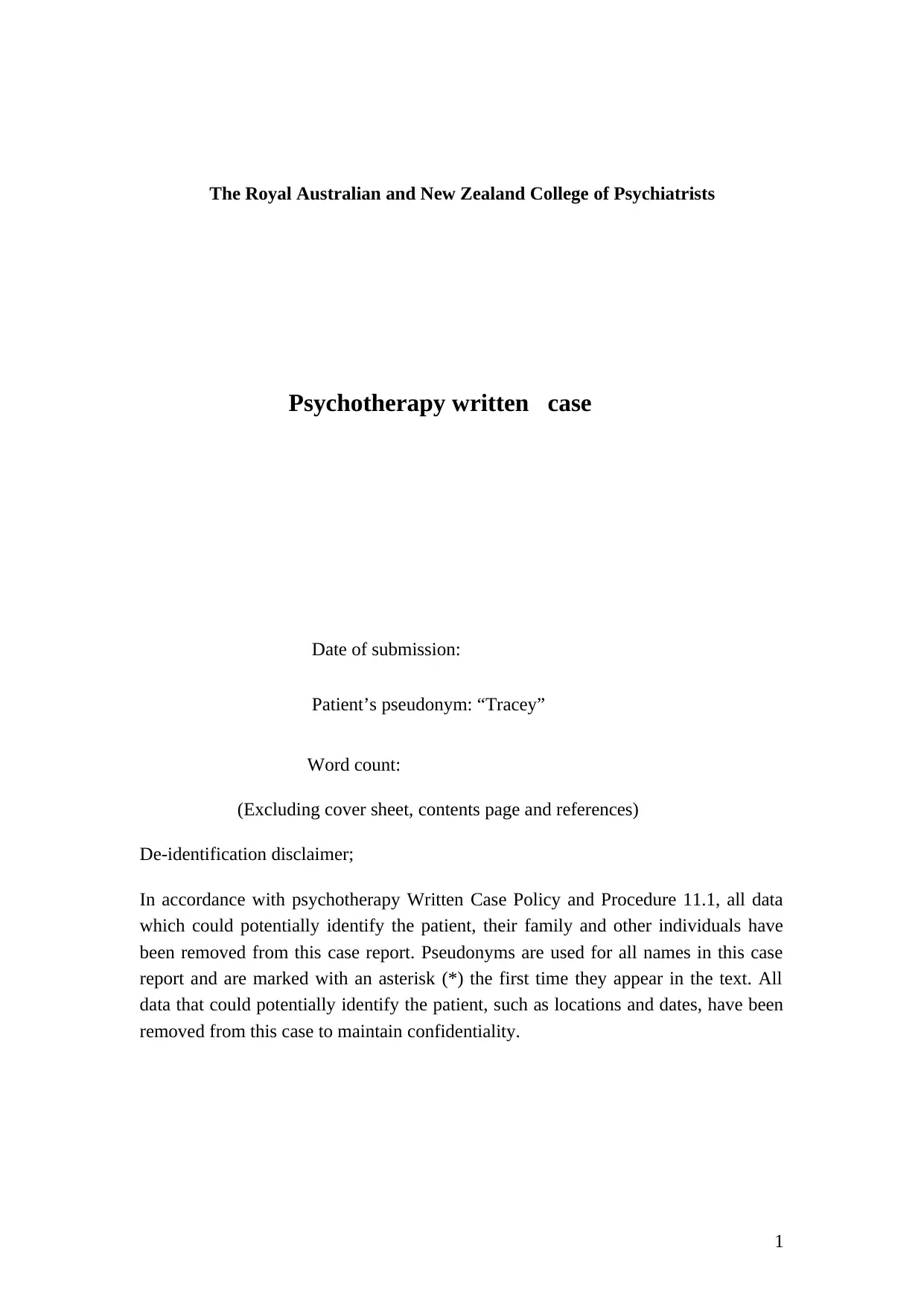
The Royal Australian and New Zealand College of Psychiatrists
Psychotherapy written case
Date of submission:
Patient’s pseudonym: “Tracey”
Word count:
(Excluding cover sheet, contents page and references)
De-identification disclaimer;
In accordance with psychotherapy Written Case Policy and Procedure 11.1, all data
which could potentially identify the patient, their family and other individuals have
been removed from this case report. Pseudonyms are used for all names in this case
report and are marked with an asterisk (*) the first time they appear in the text. All
data that could potentially identify the patient, such as locations and dates, have been
removed from this case to maintain confidentiality.
1
Psychotherapy written case
Date of submission:
Patient’s pseudonym: “Tracey”
Word count:
(Excluding cover sheet, contents page and references)
De-identification disclaimer;
In accordance with psychotherapy Written Case Policy and Procedure 11.1, all data
which could potentially identify the patient, their family and other individuals have
been removed from this case report. Pseudonyms are used for all names in this case
report and are marked with an asterisk (*) the first time they appear in the text. All
data that could potentially identify the patient, such as locations and dates, have been
removed from this case to maintain confidentiality.
1
Paraphrase This Document
Need a fresh take? Get an instant paraphrase of this document with our AI Paraphraser
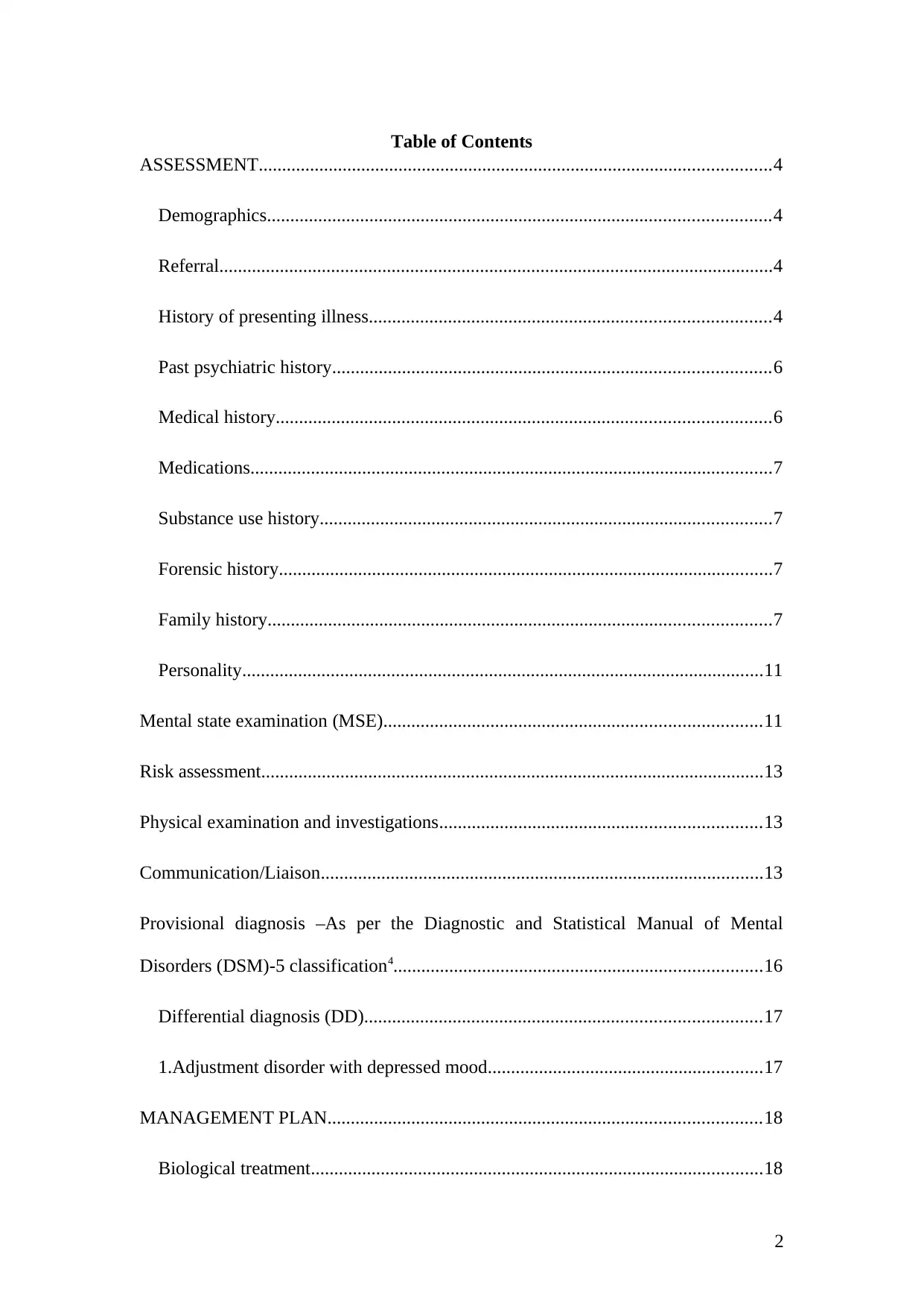
Table of Contents
ASSESSMENT..............................................................................................................4
Demographics............................................................................................................4
Referral.......................................................................................................................4
History of presenting illness......................................................................................4
Past psychiatric history..............................................................................................6
Medical history..........................................................................................................6
Medications................................................................................................................7
Substance use history.................................................................................................7
Forensic history..........................................................................................................7
Family history............................................................................................................7
Personality................................................................................................................11
Mental state examination (MSE).................................................................................11
Risk assessment............................................................................................................13
Physical examination and investigations.....................................................................13
Communication/Liaison...............................................................................................13
Provisional diagnosis –As per the Diagnostic and Statistical Manual of Mental
Disorders (DSM)-5 classification4...............................................................................16
Differential diagnosis (DD).....................................................................................17
1.Adjustment disorder with depressed mood...........................................................17
MANAGEMENT PLAN.............................................................................................18
Biological treatment.................................................................................................18
2
ASSESSMENT..............................................................................................................4
Demographics............................................................................................................4
Referral.......................................................................................................................4
History of presenting illness......................................................................................4
Past psychiatric history..............................................................................................6
Medical history..........................................................................................................6
Medications................................................................................................................7
Substance use history.................................................................................................7
Forensic history..........................................................................................................7
Family history............................................................................................................7
Personality................................................................................................................11
Mental state examination (MSE).................................................................................11
Risk assessment............................................................................................................13
Physical examination and investigations.....................................................................13
Communication/Liaison...............................................................................................13
Provisional diagnosis –As per the Diagnostic and Statistical Manual of Mental
Disorders (DSM)-5 classification4...............................................................................16
Differential diagnosis (DD).....................................................................................17
1.Adjustment disorder with depressed mood...........................................................17
MANAGEMENT PLAN.............................................................................................18
Biological treatment.................................................................................................18
2
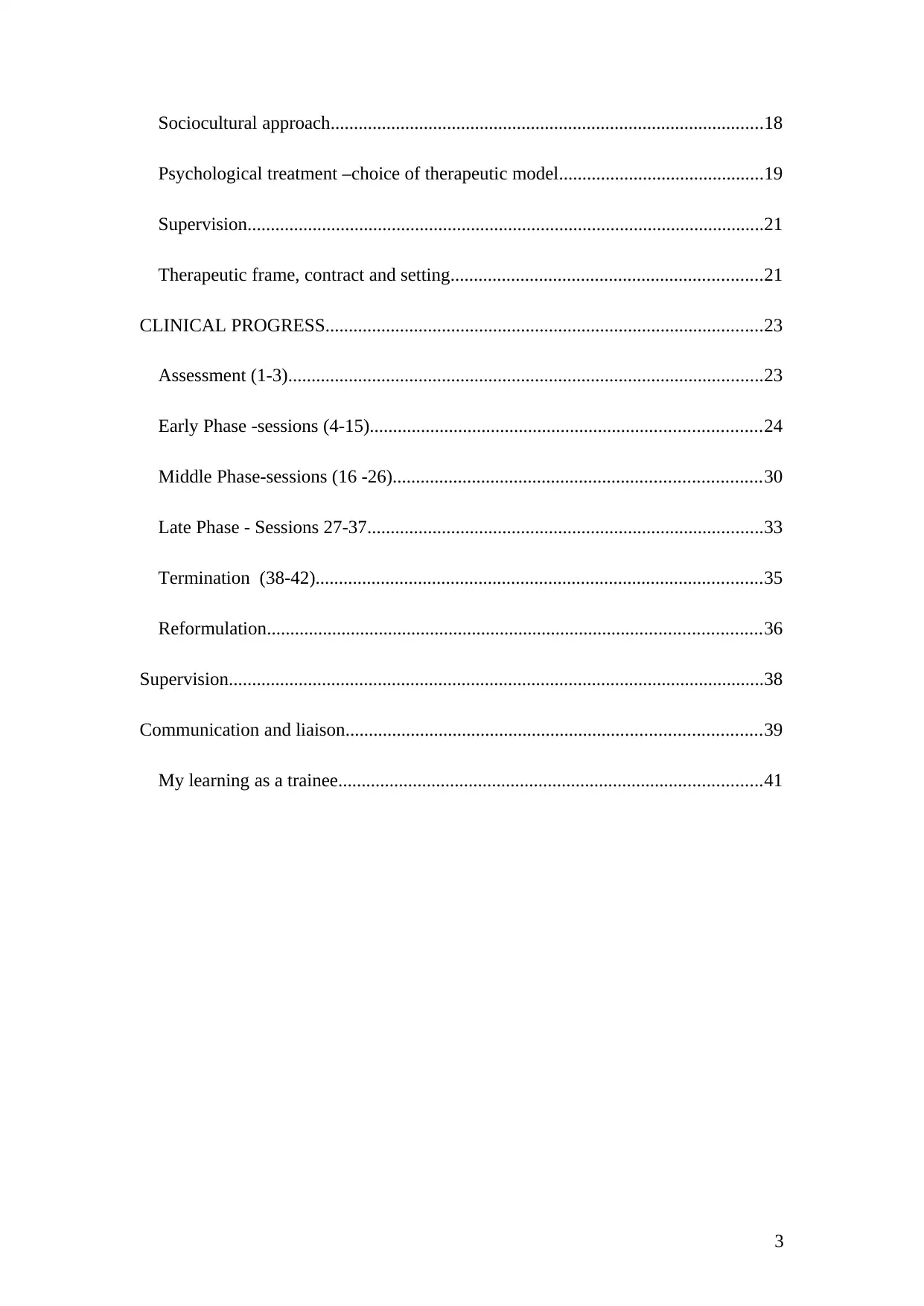
Sociocultural approach.............................................................................................18
Psychological treatment –choice of therapeutic model............................................19
Supervision...............................................................................................................21
Therapeutic frame, contract and setting...................................................................21
CLINICAL PROGRESS..............................................................................................23
Assessment (1-3)......................................................................................................23
Early Phase -sessions (4-15)....................................................................................24
Middle Phase-sessions (16 -26)...............................................................................30
Late Phase - Sessions 27-37.....................................................................................33
Termination (38-42)................................................................................................35
Reformulation..........................................................................................................36
Supervision...................................................................................................................38
Communication and liaison.........................................................................................39
My learning as a trainee...........................................................................................41
3
Psychological treatment –choice of therapeutic model............................................19
Supervision...............................................................................................................21
Therapeutic frame, contract and setting...................................................................21
CLINICAL PROGRESS..............................................................................................23
Assessment (1-3)......................................................................................................23
Early Phase -sessions (4-15)....................................................................................24
Middle Phase-sessions (16 -26)...............................................................................30
Late Phase - Sessions 27-37.....................................................................................33
Termination (38-42)................................................................................................35
Reformulation..........................................................................................................36
Supervision...................................................................................................................38
Communication and liaison.........................................................................................39
My learning as a trainee...........................................................................................41
3
⊘ This is a preview!⊘
Do you want full access?
Subscribe today to unlock all pages.

Trusted by 1+ million students worldwide
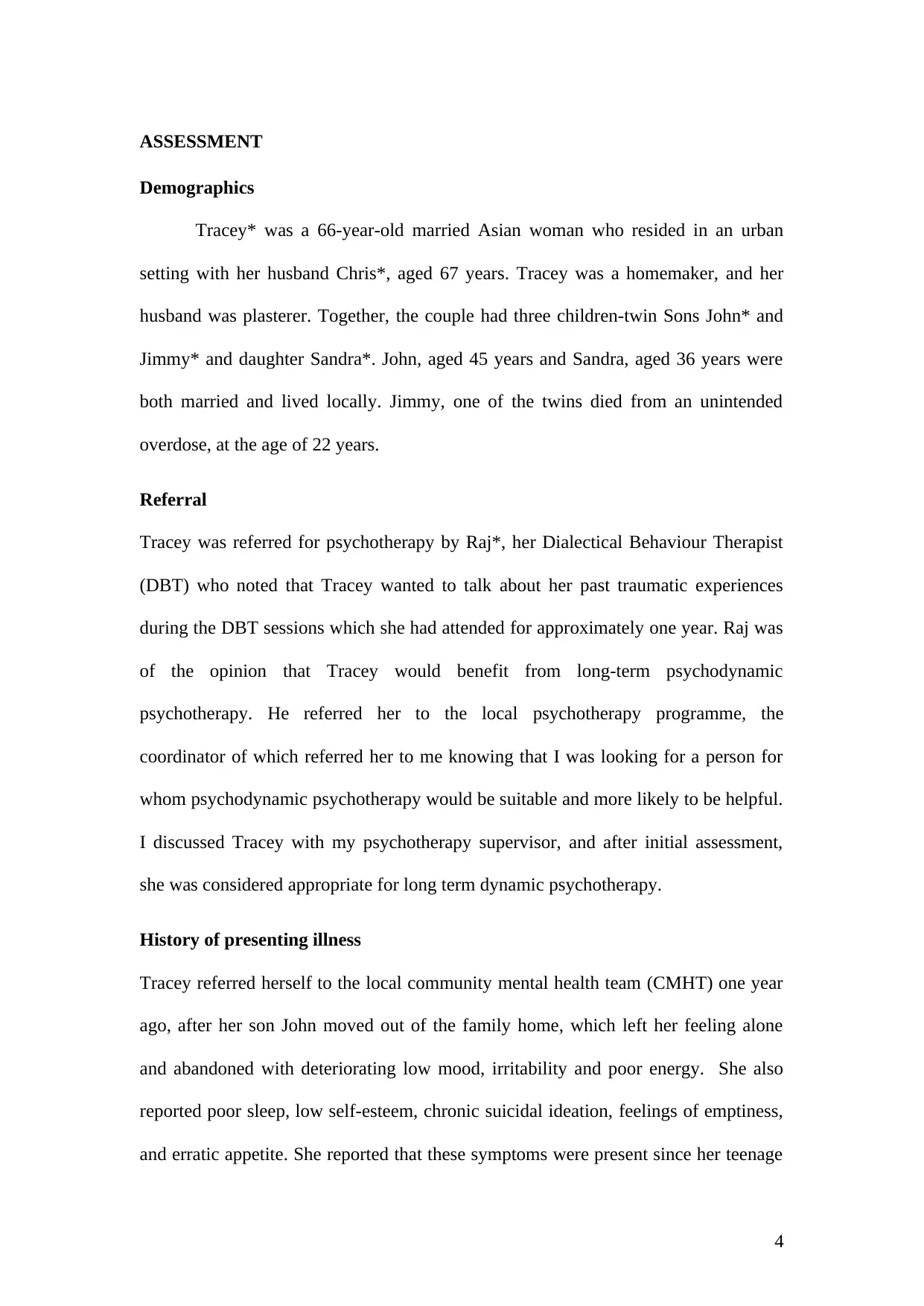
ASSESSMENT
Demographics
Tracey* was a 66-year-old married Asian woman who resided in an urban
setting with her husband Chris*, aged 67 years. Tracey was a homemaker, and her
husband was plasterer. Together, the couple had three children-twin Sons John* and
Jimmy* and daughter Sandra*. John, aged 45 years and Sandra, aged 36 years were
both married and lived locally. Jimmy, one of the twins died from an unintended
overdose, at the age of 22 years.
Referral
Tracey was referred for psychotherapy by Raj*, her Dialectical Behaviour Therapist
(DBT) who noted that Tracey wanted to talk about her past traumatic experiences
during the DBT sessions which she had attended for approximately one year. Raj was
of the opinion that Tracey would benefit from long-term psychodynamic
psychotherapy. He referred her to the local psychotherapy programme, the
coordinator of which referred her to me knowing that I was looking for a person for
whom psychodynamic psychotherapy would be suitable and more likely to be helpful.
I discussed Tracey with my psychotherapy supervisor, and after initial assessment,
she was considered appropriate for long term dynamic psychotherapy.
History of presenting illness
Tracey referred herself to the local community mental health team (CMHT) one year
ago, after her son John moved out of the family home, which left her feeling alone
and abandoned with deteriorating low mood, irritability and poor energy. She also
reported poor sleep, low self-esteem, chronic suicidal ideation, feelings of emptiness,
and erratic appetite. She reported that these symptoms were present since her teenage
4
Demographics
Tracey* was a 66-year-old married Asian woman who resided in an urban
setting with her husband Chris*, aged 67 years. Tracey was a homemaker, and her
husband was plasterer. Together, the couple had three children-twin Sons John* and
Jimmy* and daughter Sandra*. John, aged 45 years and Sandra, aged 36 years were
both married and lived locally. Jimmy, one of the twins died from an unintended
overdose, at the age of 22 years.
Referral
Tracey was referred for psychotherapy by Raj*, her Dialectical Behaviour Therapist
(DBT) who noted that Tracey wanted to talk about her past traumatic experiences
during the DBT sessions which she had attended for approximately one year. Raj was
of the opinion that Tracey would benefit from long-term psychodynamic
psychotherapy. He referred her to the local psychotherapy programme, the
coordinator of which referred her to me knowing that I was looking for a person for
whom psychodynamic psychotherapy would be suitable and more likely to be helpful.
I discussed Tracey with my psychotherapy supervisor, and after initial assessment,
she was considered appropriate for long term dynamic psychotherapy.
History of presenting illness
Tracey referred herself to the local community mental health team (CMHT) one year
ago, after her son John moved out of the family home, which left her feeling alone
and abandoned with deteriorating low mood, irritability and poor energy. She also
reported poor sleep, low self-esteem, chronic suicidal ideation, feelings of emptiness,
and erratic appetite. She reported that these symptoms were present since her teenage
4
Paraphrase This Document
Need a fresh take? Get an instant paraphrase of this document with our AI Paraphraser
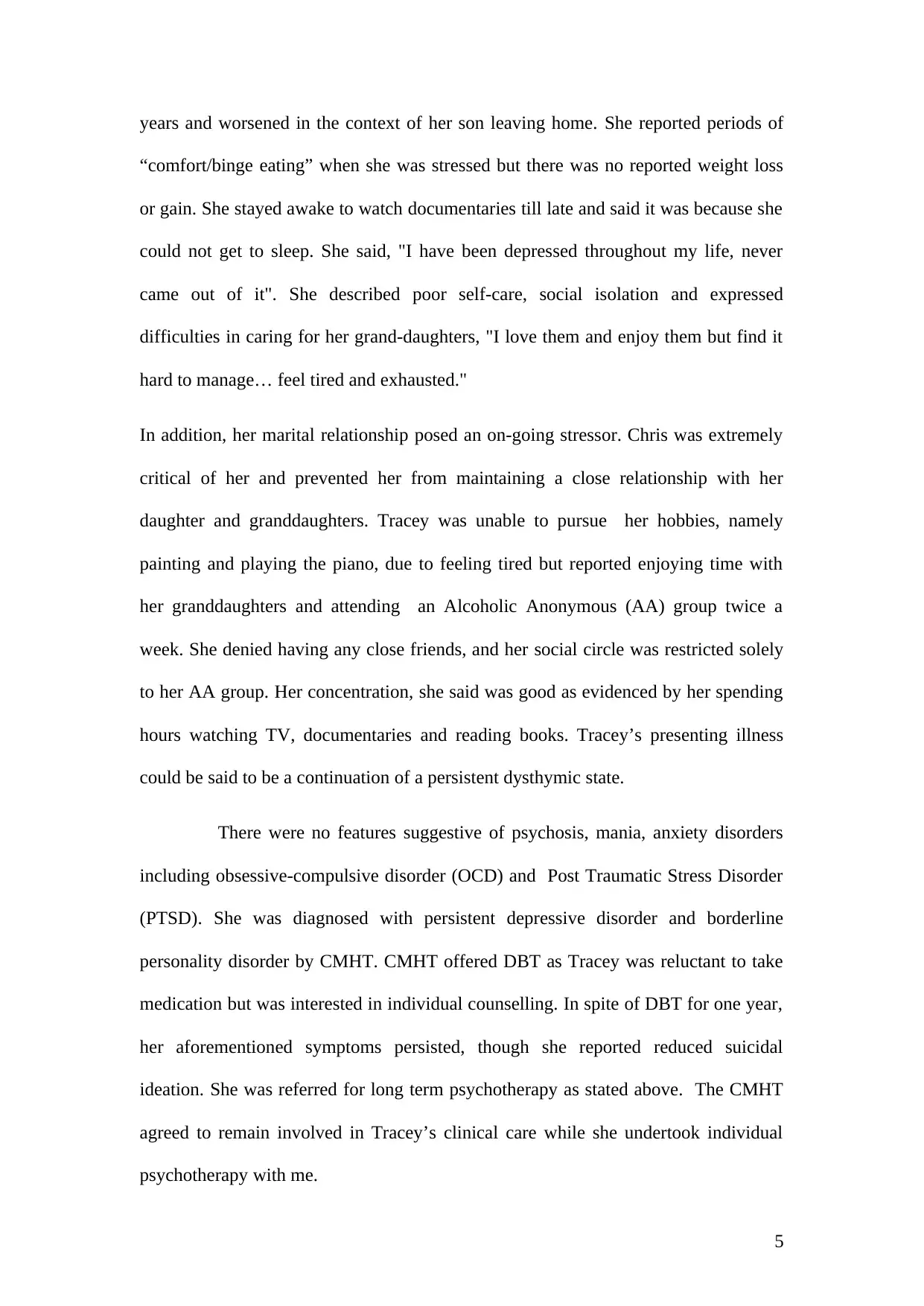
years and worsened in the context of her son leaving home. She reported periods of
“comfort/binge eating” when she was stressed but there was no reported weight loss
or gain. She stayed awake to watch documentaries till late and said it was because she
could not get to sleep. She said, "I have been depressed throughout my life, never
came out of it". She described poor self-care, social isolation and expressed
difficulties in caring for her grand-daughters, "I love them and enjoy them but find it
hard to manage… feel tired and exhausted."
In addition, her marital relationship posed an on-going stressor. Chris was extremely
critical of her and prevented her from maintaining a close relationship with her
daughter and granddaughters. Tracey was unable to pursue her hobbies, namely
painting and playing the piano, due to feeling tired but reported enjoying time with
her granddaughters and attending an Alcoholic Anonymous (AA) group twice a
week. She denied having any close friends, and her social circle was restricted solely
to her AA group. Her concentration, she said was good as evidenced by her spending
hours watching TV, documentaries and reading books. Tracey’s presenting illness
could be said to be a continuation of a persistent dysthymic state.
There were no features suggestive of psychosis, mania, anxiety disorders
including obsessive-compulsive disorder (OCD) and Post Traumatic Stress Disorder
(PTSD). She was diagnosed with persistent depressive disorder and borderline
personality disorder by CMHT. CMHT offered DBT as Tracey was reluctant to take
medication but was interested in individual counselling. In spite of DBT for one year,
her aforementioned symptoms persisted, though she reported reduced suicidal
ideation. She was referred for long term psychotherapy as stated above. The CMHT
agreed to remain involved in Tracey’s clinical care while she undertook individual
psychotherapy with me.
5
“comfort/binge eating” when she was stressed but there was no reported weight loss
or gain. She stayed awake to watch documentaries till late and said it was because she
could not get to sleep. She said, "I have been depressed throughout my life, never
came out of it". She described poor self-care, social isolation and expressed
difficulties in caring for her grand-daughters, "I love them and enjoy them but find it
hard to manage… feel tired and exhausted."
In addition, her marital relationship posed an on-going stressor. Chris was extremely
critical of her and prevented her from maintaining a close relationship with her
daughter and granddaughters. Tracey was unable to pursue her hobbies, namely
painting and playing the piano, due to feeling tired but reported enjoying time with
her granddaughters and attending an Alcoholic Anonymous (AA) group twice a
week. She denied having any close friends, and her social circle was restricted solely
to her AA group. Her concentration, she said was good as evidenced by her spending
hours watching TV, documentaries and reading books. Tracey’s presenting illness
could be said to be a continuation of a persistent dysthymic state.
There were no features suggestive of psychosis, mania, anxiety disorders
including obsessive-compulsive disorder (OCD) and Post Traumatic Stress Disorder
(PTSD). She was diagnosed with persistent depressive disorder and borderline
personality disorder by CMHT. CMHT offered DBT as Tracey was reluctant to take
medication but was interested in individual counselling. In spite of DBT for one year,
her aforementioned symptoms persisted, though she reported reduced suicidal
ideation. She was referred for long term psychotherapy as stated above. The CMHT
agreed to remain involved in Tracey’s clinical care while she undertook individual
psychotherapy with me.
5
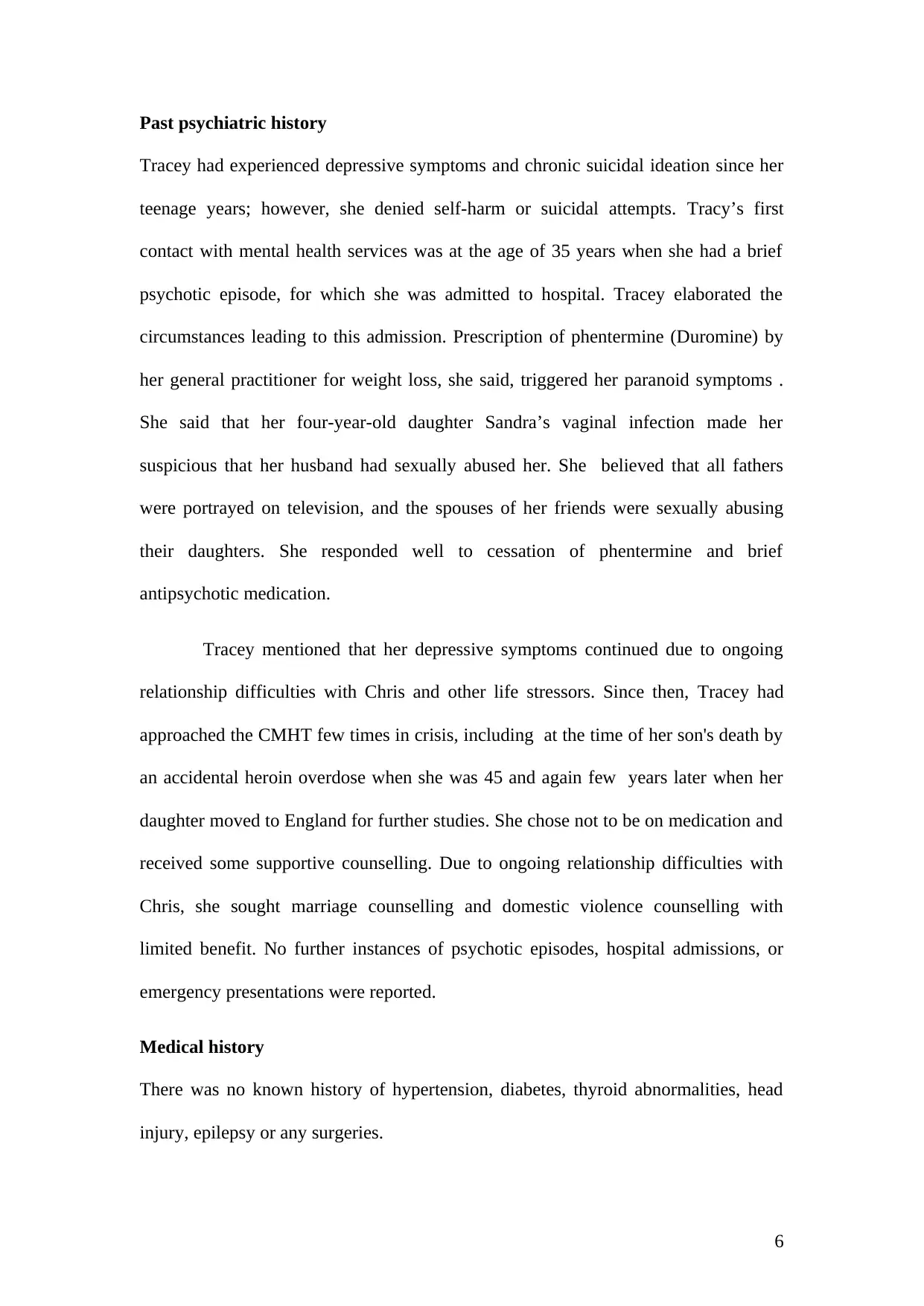
Past psychiatric history
Tracey had experienced depressive symptoms and chronic suicidal ideation since her
teenage years; however, she denied self-harm or suicidal attempts. Tracy’s first
contact with mental health services was at the age of 35 years when she had a brief
psychotic episode, for which she was admitted to hospital. Tracey elaborated the
circumstances leading to this admission. Prescription of phentermine (Duromine) by
her general practitioner for weight loss, she said, triggered her paranoid symptoms .
She said that her four-year-old daughter Sandra’s vaginal infection made her
suspicious that her husband had sexually abused her. She believed that all fathers
were portrayed on television, and the spouses of her friends were sexually abusing
their daughters. She responded well to cessation of phentermine and brief
antipsychotic medication.
Tracey mentioned that her depressive symptoms continued due to ongoing
relationship difficulties with Chris and other life stressors. Since then, Tracey had
approached the CMHT few times in crisis, including at the time of her son's death by
an accidental heroin overdose when she was 45 and again few years later when her
daughter moved to England for further studies. She chose not to be on medication and
received some supportive counselling. Due to ongoing relationship difficulties with
Chris, she sought marriage counselling and domestic violence counselling with
limited benefit. No further instances of psychotic episodes, hospital admissions, or
emergency presentations were reported.
Medical history
There was no known history of hypertension, diabetes, thyroid abnormalities, head
injury, epilepsy or any surgeries.
6
Tracey had experienced depressive symptoms and chronic suicidal ideation since her
teenage years; however, she denied self-harm or suicidal attempts. Tracy’s first
contact with mental health services was at the age of 35 years when she had a brief
psychotic episode, for which she was admitted to hospital. Tracey elaborated the
circumstances leading to this admission. Prescription of phentermine (Duromine) by
her general practitioner for weight loss, she said, triggered her paranoid symptoms .
She said that her four-year-old daughter Sandra’s vaginal infection made her
suspicious that her husband had sexually abused her. She believed that all fathers
were portrayed on television, and the spouses of her friends were sexually abusing
their daughters. She responded well to cessation of phentermine and brief
antipsychotic medication.
Tracey mentioned that her depressive symptoms continued due to ongoing
relationship difficulties with Chris and other life stressors. Since then, Tracey had
approached the CMHT few times in crisis, including at the time of her son's death by
an accidental heroin overdose when she was 45 and again few years later when her
daughter moved to England for further studies. She chose not to be on medication and
received some supportive counselling. Due to ongoing relationship difficulties with
Chris, she sought marriage counselling and domestic violence counselling with
limited benefit. No further instances of psychotic episodes, hospital admissions, or
emergency presentations were reported.
Medical history
There was no known history of hypertension, diabetes, thyroid abnormalities, head
injury, epilepsy or any surgeries.
6
⊘ This is a preview!⊘
Do you want full access?
Subscribe today to unlock all pages.

Trusted by 1+ million students worldwide
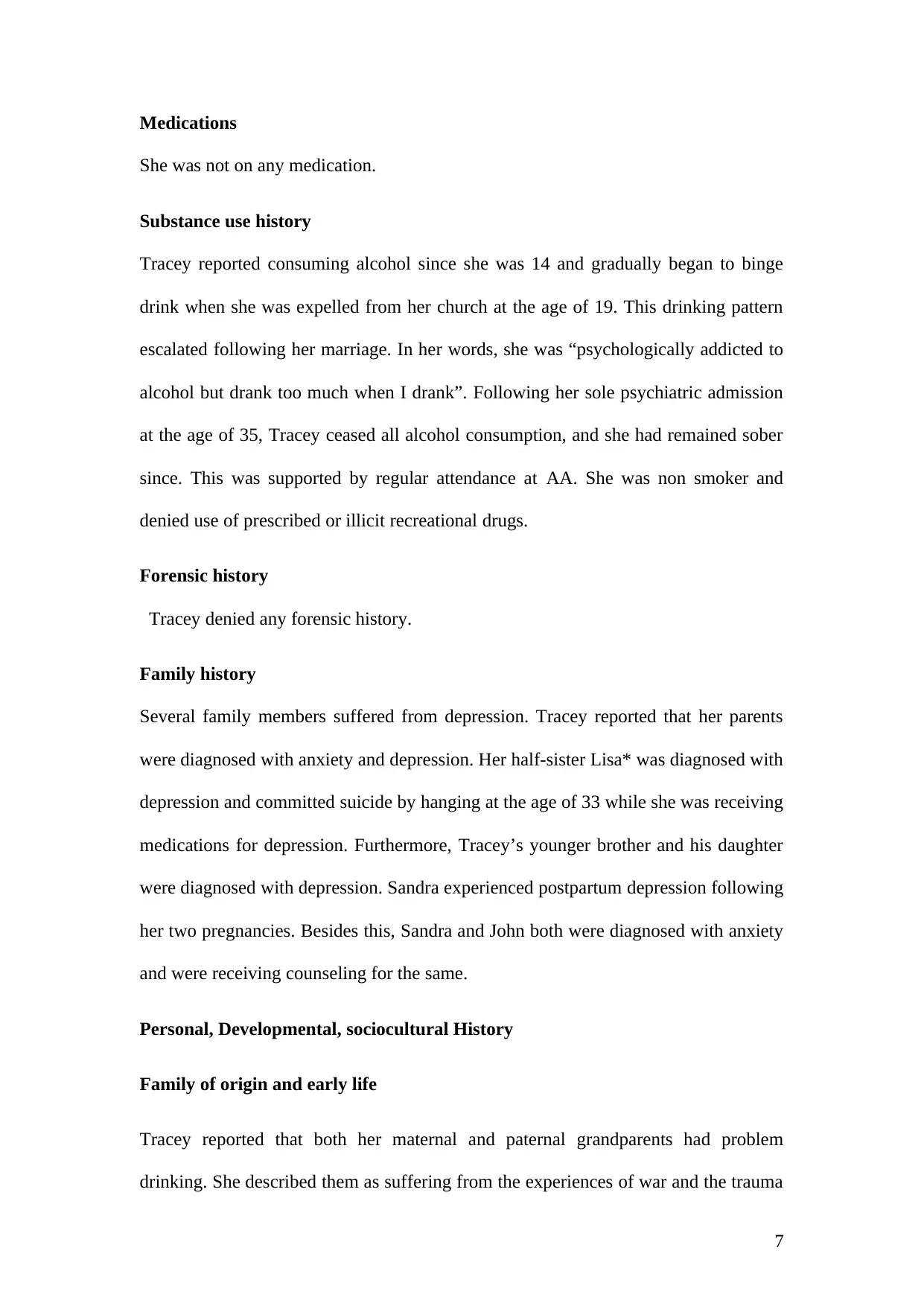
Medications
She was not on any medication.
Substance use history
Tracey reported consuming alcohol since she was 14 and gradually began to binge
drink when she was expelled from her church at the age of 19. This drinking pattern
escalated following her marriage. In her words, she was “psychologically addicted to
alcohol but drank too much when I drank”. Following her sole psychiatric admission
at the age of 35, Tracey ceased all alcohol consumption, and she had remained sober
since. This was supported by regular attendance at AA. She was non smoker and
denied use of prescribed or illicit recreational drugs.
Forensic history
Tracey denied any forensic history.
Family history
Several family members suffered from depression. Tracey reported that her parents
were diagnosed with anxiety and depression. Her half-sister Lisa* was diagnosed with
depression and committed suicide by hanging at the age of 33 while she was receiving
medications for depression. Furthermore, Tracey’s younger brother and his daughter
were diagnosed with depression. Sandra experienced postpartum depression following
her two pregnancies. Besides this, Sandra and John both were diagnosed with anxiety
and were receiving counseling for the same.
Personal, Developmental, sociocultural History
Family of origin and early life
Tracey reported that both her maternal and paternal grandparents had problem
drinking. She described them as suffering from the experiences of war and the trauma
7
She was not on any medication.
Substance use history
Tracey reported consuming alcohol since she was 14 and gradually began to binge
drink when she was expelled from her church at the age of 19. This drinking pattern
escalated following her marriage. In her words, she was “psychologically addicted to
alcohol but drank too much when I drank”. Following her sole psychiatric admission
at the age of 35, Tracey ceased all alcohol consumption, and she had remained sober
since. This was supported by regular attendance at AA. She was non smoker and
denied use of prescribed or illicit recreational drugs.
Forensic history
Tracey denied any forensic history.
Family history
Several family members suffered from depression. Tracey reported that her parents
were diagnosed with anxiety and depression. Her half-sister Lisa* was diagnosed with
depression and committed suicide by hanging at the age of 33 while she was receiving
medications for depression. Furthermore, Tracey’s younger brother and his daughter
were diagnosed with depression. Sandra experienced postpartum depression following
her two pregnancies. Besides this, Sandra and John both were diagnosed with anxiety
and were receiving counseling for the same.
Personal, Developmental, sociocultural History
Family of origin and early life
Tracey reported that both her maternal and paternal grandparents had problem
drinking. She described them as suffering from the experiences of war and the trauma
7
Paraphrase This Document
Need a fresh take? Get an instant paraphrase of this document with our AI Paraphraser
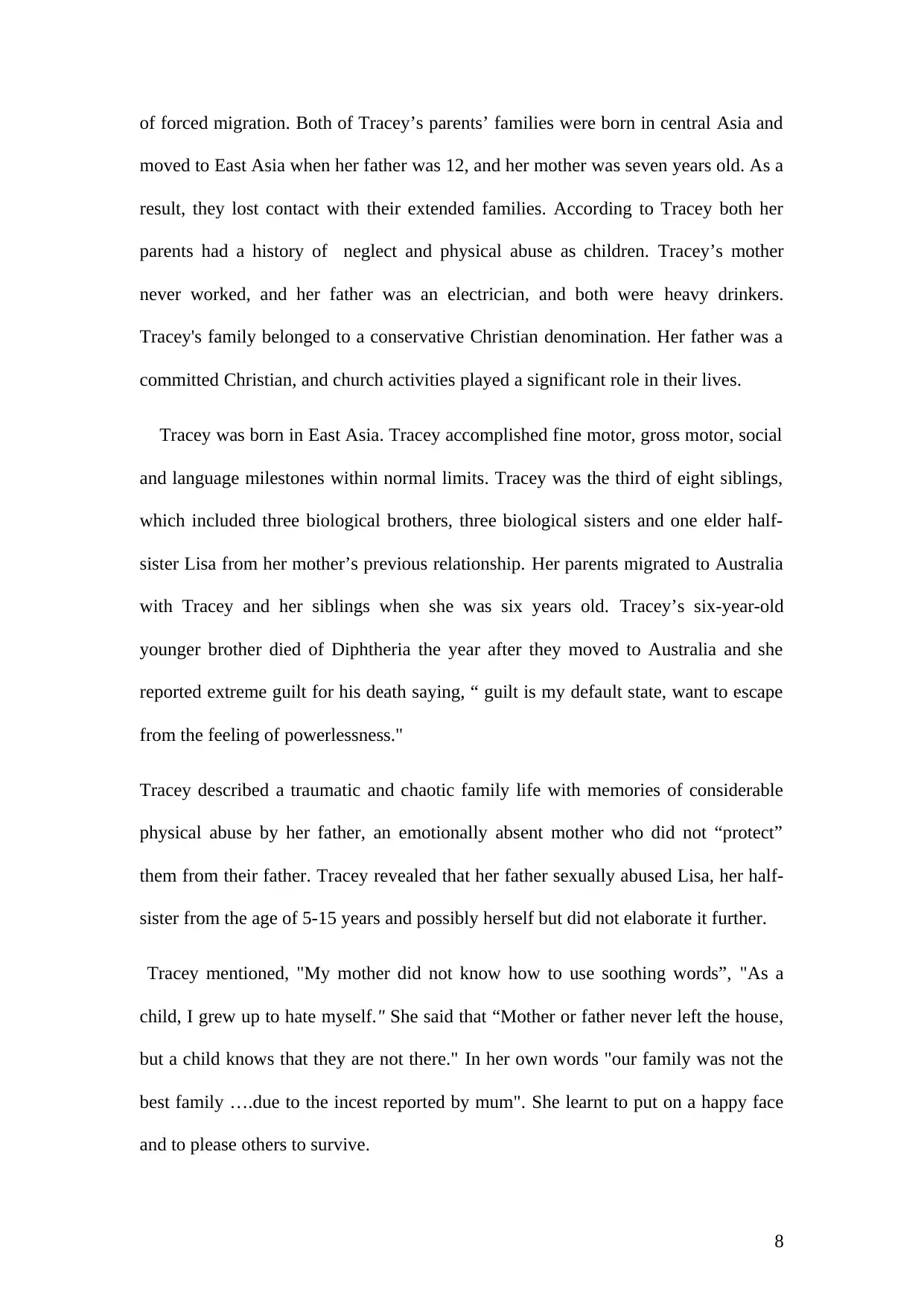
of forced migration. Both of Tracey’s parents’ families were born in central Asia and
moved to East Asia when her father was 12, and her mother was seven years old. As a
result, they lost contact with their extended families. According to Tracey both her
parents had a history of neglect and physical abuse as children. Tracey’s mother
never worked, and her father was an electrician, and both were heavy drinkers.
Tracey's family belonged to a conservative Christian denomination. Her father was a
committed Christian, and church activities played a significant role in their lives.
Tracey was born in East Asia. Tracey accomplished fine motor, gross motor, social
and language milestones within normal limits. Tracey was the third of eight siblings,
which included three biological brothers, three biological sisters and one elder half-
sister Lisa from her mother’s previous relationship. Her parents migrated to Australia
with Tracey and her siblings when she was six years old. Tracey’s six-year-old
younger brother died of Diphtheria the year after they moved to Australia and she
reported extreme guilt for his death saying, “ guilt is my default state, want to escape
from the feeling of powerlessness."
Tracey described a traumatic and chaotic family life with memories of considerable
physical abuse by her father, an emotionally absent mother who did not “protect”
them from their father. Tracey revealed that her father sexually abused Lisa, her half-
sister from the age of 5-15 years and possibly herself but did not elaborate it further.
Tracey mentioned, "My mother did not know how to use soothing words”, "As a
child, I grew up to hate myself." She said that “Mother or father never left the house,
but a child knows that they are not there." In her own words "our family was not the
best family ….due to the incest reported by mum". She learnt to put on a happy face
and to please others to survive.
8
moved to East Asia when her father was 12, and her mother was seven years old. As a
result, they lost contact with their extended families. According to Tracey both her
parents had a history of neglect and physical abuse as children. Tracey’s mother
never worked, and her father was an electrician, and both were heavy drinkers.
Tracey's family belonged to a conservative Christian denomination. Her father was a
committed Christian, and church activities played a significant role in their lives.
Tracey was born in East Asia. Tracey accomplished fine motor, gross motor, social
and language milestones within normal limits. Tracey was the third of eight siblings,
which included three biological brothers, three biological sisters and one elder half-
sister Lisa from her mother’s previous relationship. Her parents migrated to Australia
with Tracey and her siblings when she was six years old. Tracey’s six-year-old
younger brother died of Diphtheria the year after they moved to Australia and she
reported extreme guilt for his death saying, “ guilt is my default state, want to escape
from the feeling of powerlessness."
Tracey described a traumatic and chaotic family life with memories of considerable
physical abuse by her father, an emotionally absent mother who did not “protect”
them from their father. Tracey revealed that her father sexually abused Lisa, her half-
sister from the age of 5-15 years and possibly herself but did not elaborate it further.
Tracey mentioned, "My mother did not know how to use soothing words”, "As a
child, I grew up to hate myself." She said that “Mother or father never left the house,
but a child knows that they are not there." In her own words "our family was not the
best family ….due to the incest reported by mum". She learnt to put on a happy face
and to please others to survive.
8
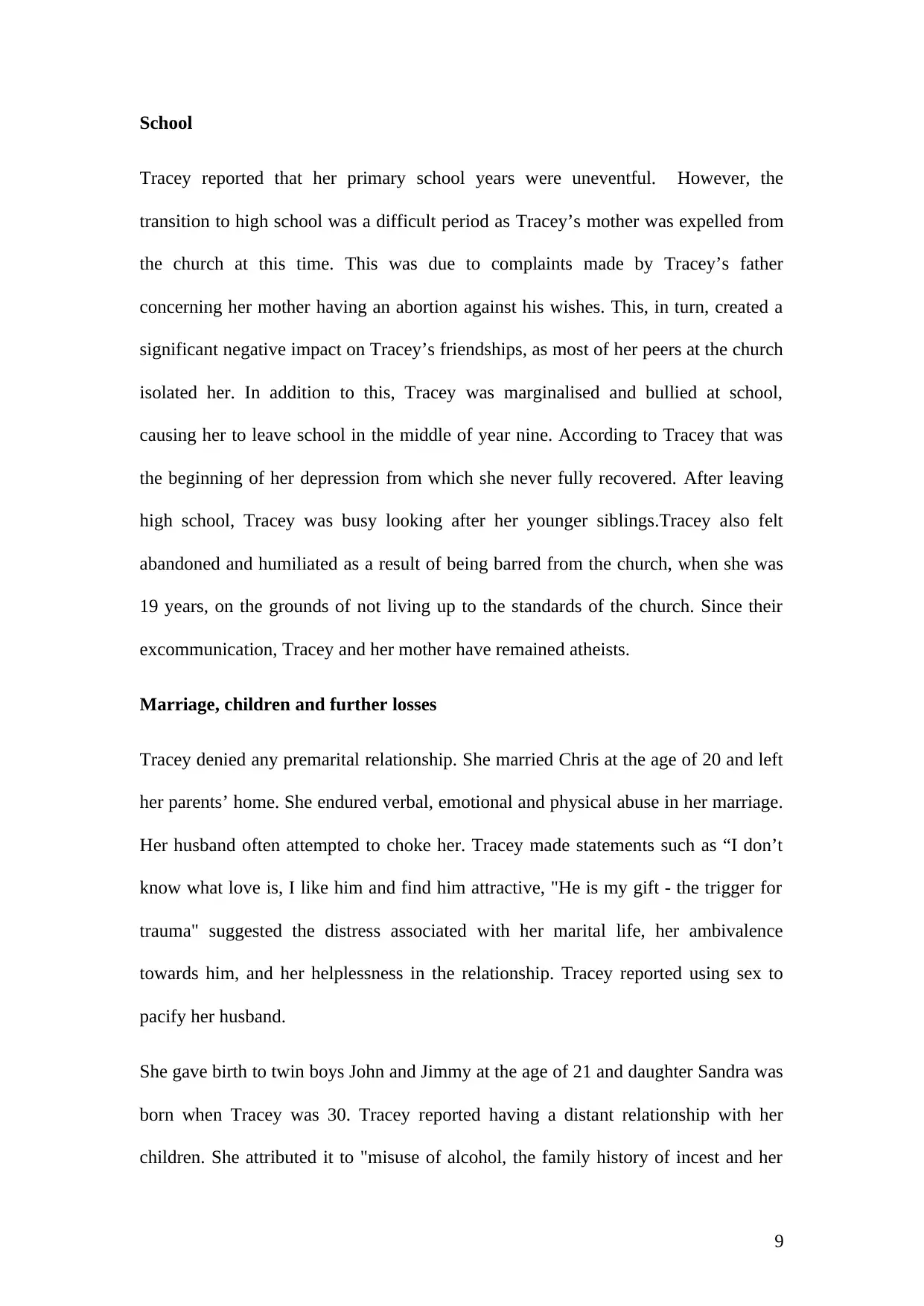
School
Tracey reported that her primary school years were uneventful. However, the
transition to high school was a difficult period as Tracey’s mother was expelled from
the church at this time. This was due to complaints made by Tracey’s father
concerning her mother having an abortion against his wishes. This, in turn, created a
significant negative impact on Tracey’s friendships, as most of her peers at the church
isolated her. In addition to this, Tracey was marginalised and bullied at school,
causing her to leave school in the middle of year nine. According to Tracey that was
the beginning of her depression from which she never fully recovered. After leaving
high school, Tracey was busy looking after her younger siblings.Tracey also felt
abandoned and humiliated as a result of being barred from the church, when she was
19 years, on the grounds of not living up to the standards of the church. Since their
excommunication, Tracey and her mother have remained atheists.
Marriage, children and further losses
Tracey denied any premarital relationship. She married Chris at the age of 20 and left
her parents’ home. She endured verbal, emotional and physical abuse in her marriage.
Her husband often attempted to choke her. Tracey made statements such as “I don’t
know what love is, I like him and find him attractive, "He is my gift - the trigger for
trauma" suggested the distress associated with her marital life, her ambivalence
towards him, and her helplessness in the relationship. Tracey reported using sex to
pacify her husband.
She gave birth to twin boys John and Jimmy at the age of 21 and daughter Sandra was
born when Tracey was 30. Tracey reported having a distant relationship with her
children. She attributed it to "misuse of alcohol, the family history of incest and her
9
Tracey reported that her primary school years were uneventful. However, the
transition to high school was a difficult period as Tracey’s mother was expelled from
the church at this time. This was due to complaints made by Tracey’s father
concerning her mother having an abortion against his wishes. This, in turn, created a
significant negative impact on Tracey’s friendships, as most of her peers at the church
isolated her. In addition to this, Tracey was marginalised and bullied at school,
causing her to leave school in the middle of year nine. According to Tracey that was
the beginning of her depression from which she never fully recovered. After leaving
high school, Tracey was busy looking after her younger siblings.Tracey also felt
abandoned and humiliated as a result of being barred from the church, when she was
19 years, on the grounds of not living up to the standards of the church. Since their
excommunication, Tracey and her mother have remained atheists.
Marriage, children and further losses
Tracey denied any premarital relationship. She married Chris at the age of 20 and left
her parents’ home. She endured verbal, emotional and physical abuse in her marriage.
Her husband often attempted to choke her. Tracey made statements such as “I don’t
know what love is, I like him and find him attractive, "He is my gift - the trigger for
trauma" suggested the distress associated with her marital life, her ambivalence
towards him, and her helplessness in the relationship. Tracey reported using sex to
pacify her husband.
She gave birth to twin boys John and Jimmy at the age of 21 and daughter Sandra was
born when Tracey was 30. Tracey reported having a distant relationship with her
children. She attributed it to "misuse of alcohol, the family history of incest and her
9
⊘ This is a preview!⊘
Do you want full access?
Subscribe today to unlock all pages.

Trusted by 1+ million students worldwide
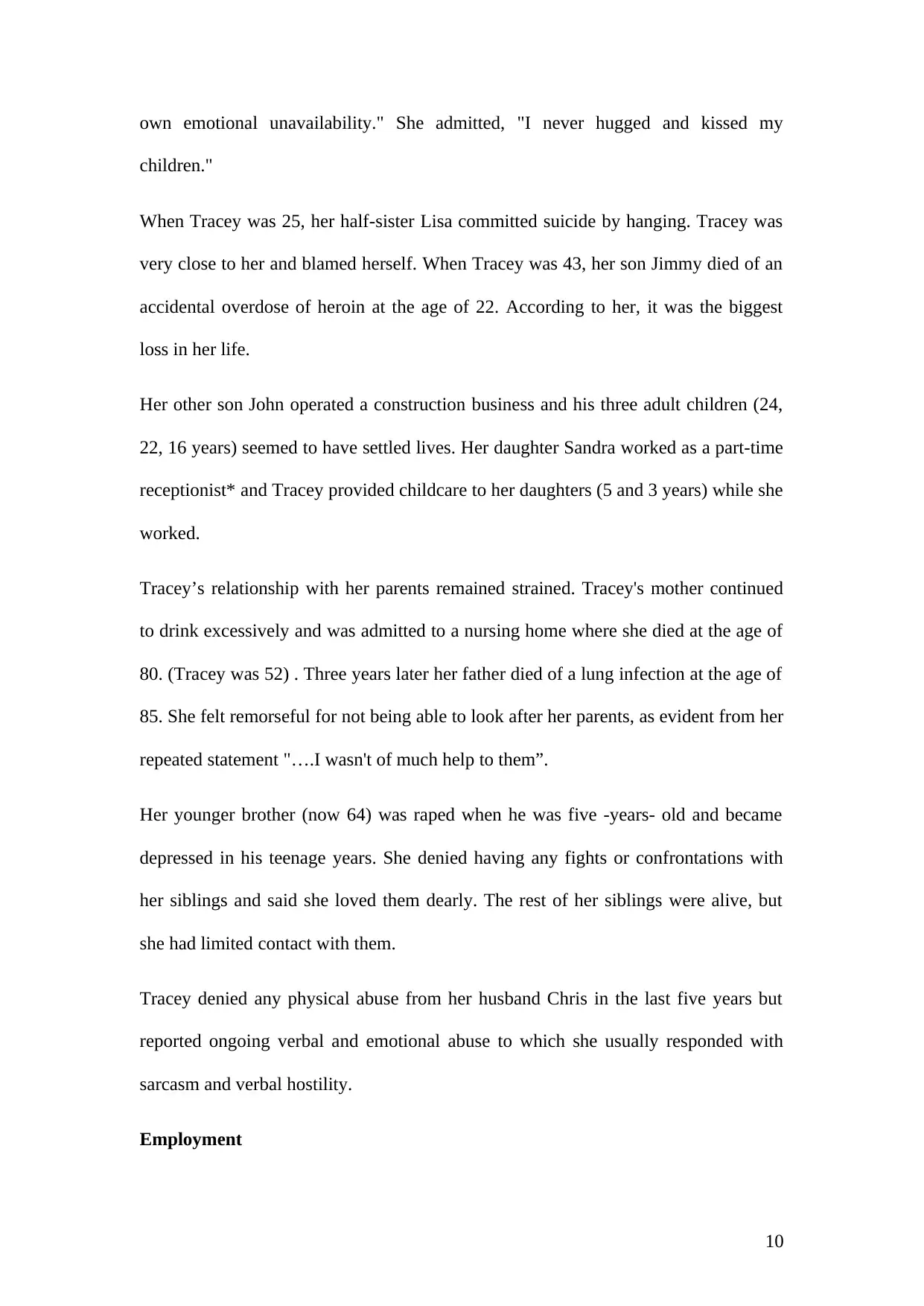
own emotional unavailability." She admitted, "I never hugged and kissed my
children."
When Tracey was 25, her half-sister Lisa committed suicide by hanging. Tracey was
very close to her and blamed herself. When Tracey was 43, her son Jimmy died of an
accidental overdose of heroin at the age of 22. According to her, it was the biggest
loss in her life.
Her other son John operated a construction business and his three adult children (24,
22, 16 years) seemed to have settled lives. Her daughter Sandra worked as a part-time
receptionist* and Tracey provided childcare to her daughters (5 and 3 years) while she
worked.
Tracey’s relationship with her parents remained strained. Tracey's mother continued
to drink excessively and was admitted to a nursing home where she died at the age of
80. (Tracey was 52) . Three years later her father died of a lung infection at the age of
85. She felt remorseful for not being able to look after her parents, as evident from her
repeated statement "….I wasn't of much help to them”.
Her younger brother (now 64) was raped when he was five -years- old and became
depressed in his teenage years. She denied having any fights or confrontations with
her siblings and said she loved them dearly. The rest of her siblings were alive, but
she had limited contact with them.
Tracey denied any physical abuse from her husband Chris in the last five years but
reported ongoing verbal and emotional abuse to which she usually responded with
sarcasm and verbal hostility.
Employment
10
children."
When Tracey was 25, her half-sister Lisa committed suicide by hanging. Tracey was
very close to her and blamed herself. When Tracey was 43, her son Jimmy died of an
accidental overdose of heroin at the age of 22. According to her, it was the biggest
loss in her life.
Her other son John operated a construction business and his three adult children (24,
22, 16 years) seemed to have settled lives. Her daughter Sandra worked as a part-time
receptionist* and Tracey provided childcare to her daughters (5 and 3 years) while she
worked.
Tracey’s relationship with her parents remained strained. Tracey's mother continued
to drink excessively and was admitted to a nursing home where she died at the age of
80. (Tracey was 52) . Three years later her father died of a lung infection at the age of
85. She felt remorseful for not being able to look after her parents, as evident from her
repeated statement "….I wasn't of much help to them”.
Her younger brother (now 64) was raped when he was five -years- old and became
depressed in his teenage years. She denied having any fights or confrontations with
her siblings and said she loved them dearly. The rest of her siblings were alive, but
she had limited contact with them.
Tracey denied any physical abuse from her husband Chris in the last five years but
reported ongoing verbal and emotional abuse to which she usually responded with
sarcasm and verbal hostility.
Employment
10
Paraphrase This Document
Need a fresh take? Get an instant paraphrase of this document with our AI Paraphraser
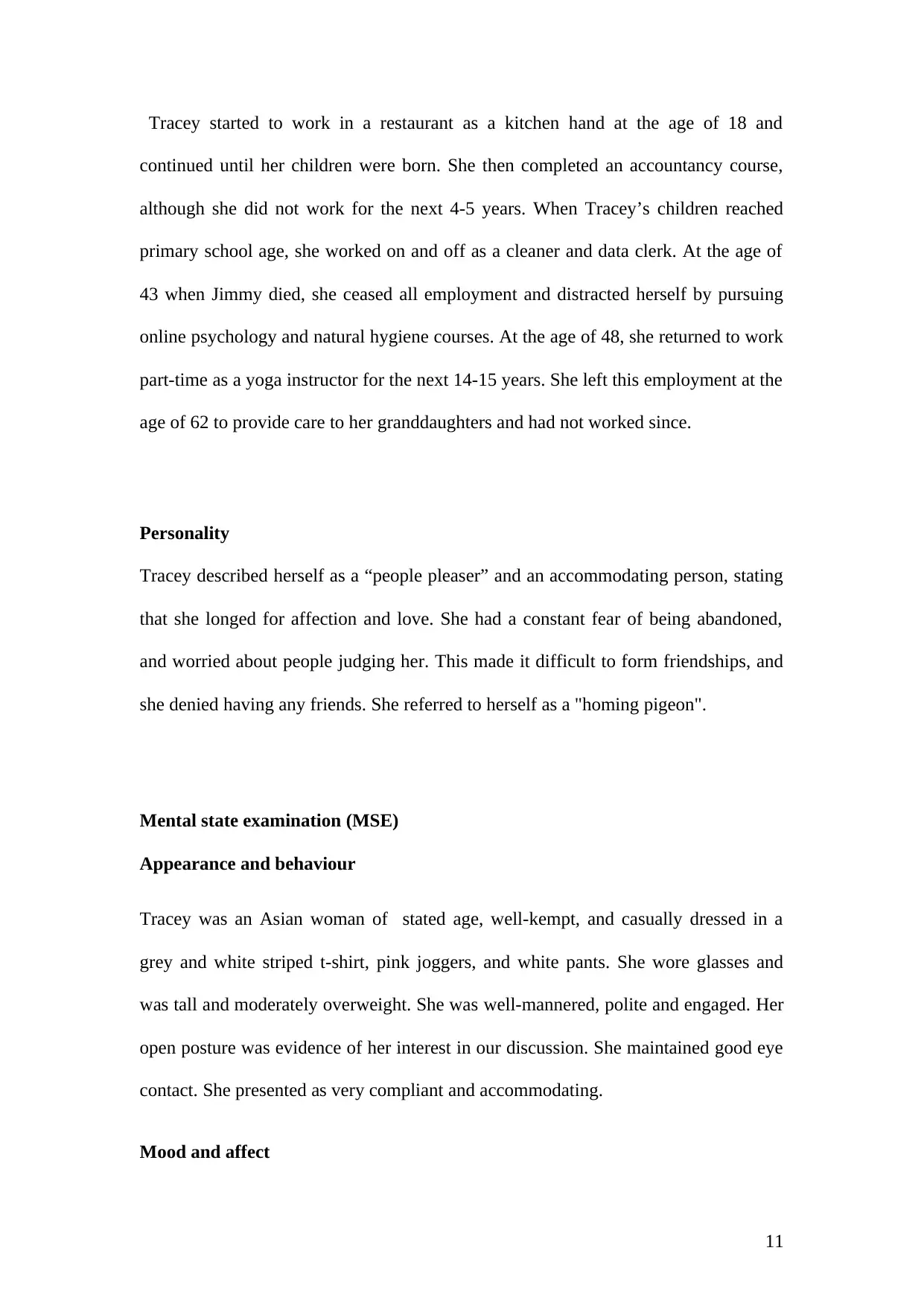
Tracey started to work in a restaurant as a kitchen hand at the age of 18 and
continued until her children were born. She then completed an accountancy course,
although she did not work for the next 4-5 years. When Tracey’s children reached
primary school age, she worked on and off as a cleaner and data clerk. At the age of
43 when Jimmy died, she ceased all employment and distracted herself by pursuing
online psychology and natural hygiene courses. At the age of 48, she returned to work
part-time as a yoga instructor for the next 14-15 years. She left this employment at the
age of 62 to provide care to her granddaughters and had not worked since.
Personality
Tracey described herself as a “people pleaser” and an accommodating person, stating
that she longed for affection and love. She had a constant fear of being abandoned,
and worried about people judging her. This made it difficult to form friendships, and
she denied having any friends. She referred to herself as a "homing pigeon".
Mental state examination (MSE)
Appearance and behaviour
Tracey was an Asian woman of stated age, well-kempt, and casually dressed in a
grey and white striped t-shirt, pink joggers, and white pants. She wore glasses and
was tall and moderately overweight. She was well-mannered, polite and engaged. Her
open posture was evidence of her interest in our discussion. She maintained good eye
contact. She presented as very compliant and accommodating.
Mood and affect
11
continued until her children were born. She then completed an accountancy course,
although she did not work for the next 4-5 years. When Tracey’s children reached
primary school age, she worked on and off as a cleaner and data clerk. At the age of
43 when Jimmy died, she ceased all employment and distracted herself by pursuing
online psychology and natural hygiene courses. At the age of 48, she returned to work
part-time as a yoga instructor for the next 14-15 years. She left this employment at the
age of 62 to provide care to her granddaughters and had not worked since.
Personality
Tracey described herself as a “people pleaser” and an accommodating person, stating
that she longed for affection and love. She had a constant fear of being abandoned,
and worried about people judging her. This made it difficult to form friendships, and
she denied having any friends. She referred to herself as a "homing pigeon".
Mental state examination (MSE)
Appearance and behaviour
Tracey was an Asian woman of stated age, well-kempt, and casually dressed in a
grey and white striped t-shirt, pink joggers, and white pants. She wore glasses and
was tall and moderately overweight. She was well-mannered, polite and engaged. Her
open posture was evidence of her interest in our discussion. She maintained good eye
contact. She presented as very compliant and accommodating.
Mood and affect
11
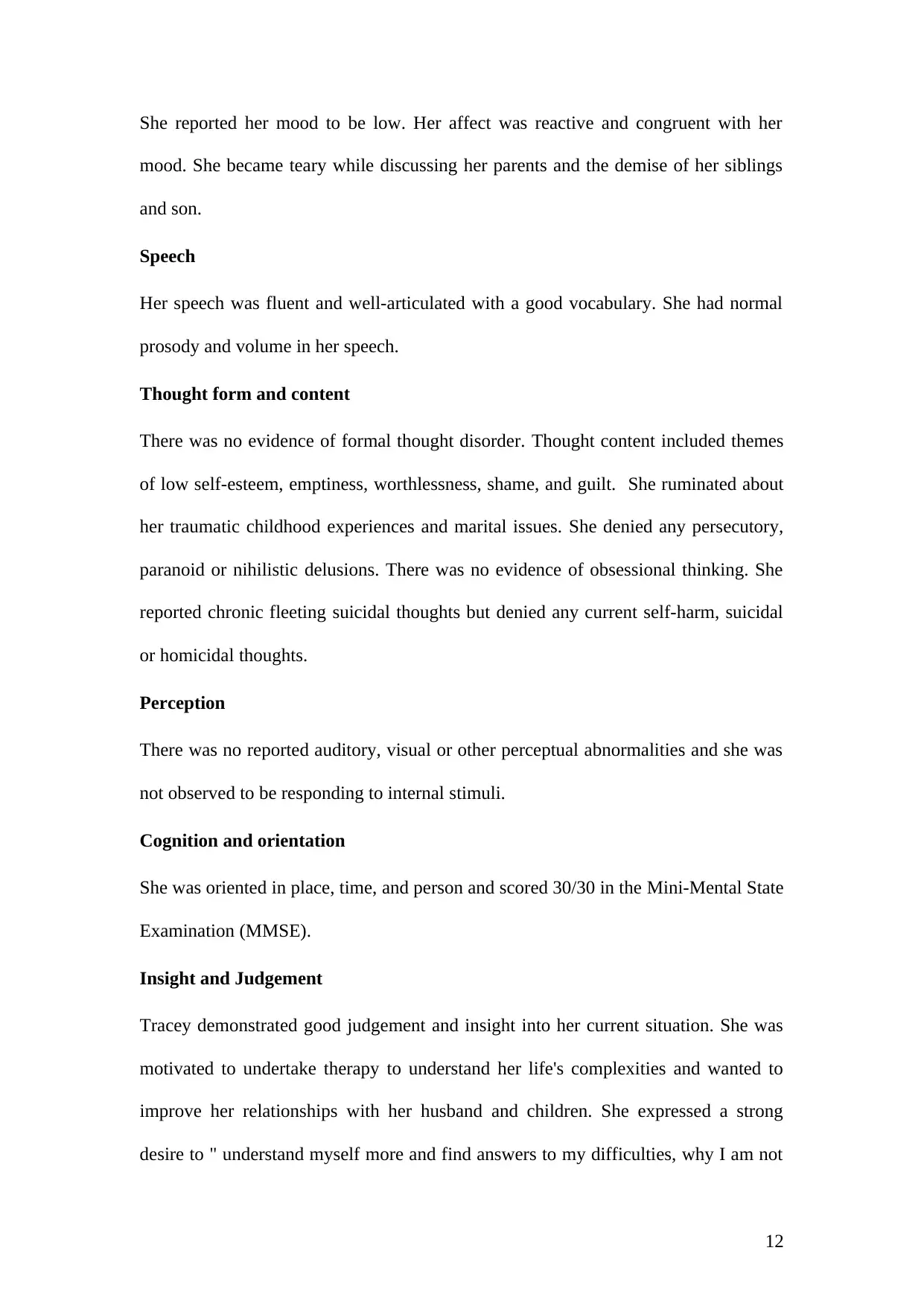
She reported her mood to be low. Her affect was reactive and congruent with her
mood. She became teary while discussing her parents and the demise of her siblings
and son.
Speech
Her speech was fluent and well-articulated with a good vocabulary. She had normal
prosody and volume in her speech.
Thought form and content
There was no evidence of formal thought disorder. Thought content included themes
of low self-esteem, emptiness, worthlessness, shame, and guilt. She ruminated about
her traumatic childhood experiences and marital issues. She denied any persecutory,
paranoid or nihilistic delusions. There was no evidence of obsessional thinking. She
reported chronic fleeting suicidal thoughts but denied any current self-harm, suicidal
or homicidal thoughts.
Perception
There was no reported auditory, visual or other perceptual abnormalities and she was
not observed to be responding to internal stimuli.
Cognition and orientation
She was oriented in place, time, and person and scored 30/30 in the Mini-Mental State
Examination (MMSE).
Insight and Judgement
Tracey demonstrated good judgement and insight into her current situation. She was
motivated to undertake therapy to understand her life's complexities and wanted to
improve her relationships with her husband and children. She expressed a strong
desire to " understand myself more and find answers to my difficulties, why I am not
12
mood. She became teary while discussing her parents and the demise of her siblings
and son.
Speech
Her speech was fluent and well-articulated with a good vocabulary. She had normal
prosody and volume in her speech.
Thought form and content
There was no evidence of formal thought disorder. Thought content included themes
of low self-esteem, emptiness, worthlessness, shame, and guilt. She ruminated about
her traumatic childhood experiences and marital issues. She denied any persecutory,
paranoid or nihilistic delusions. There was no evidence of obsessional thinking. She
reported chronic fleeting suicidal thoughts but denied any current self-harm, suicidal
or homicidal thoughts.
Perception
There was no reported auditory, visual or other perceptual abnormalities and she was
not observed to be responding to internal stimuli.
Cognition and orientation
She was oriented in place, time, and person and scored 30/30 in the Mini-Mental State
Examination (MMSE).
Insight and Judgement
Tracey demonstrated good judgement and insight into her current situation. She was
motivated to undertake therapy to understand her life's complexities and wanted to
improve her relationships with her husband and children. She expressed a strong
desire to " understand myself more and find answers to my difficulties, why I am not
12
⊘ This is a preview!⊘
Do you want full access?
Subscribe today to unlock all pages.

Trusted by 1+ million students worldwide
1 out of 44
Your All-in-One AI-Powered Toolkit for Academic Success.
+13062052269
info@desklib.com
Available 24*7 on WhatsApp / Email
![[object Object]](/_next/static/media/star-bottom.7253800d.svg)
Unlock your academic potential
Copyright © 2020–2026 A2Z Services. All Rights Reserved. Developed and managed by ZUCOL.

